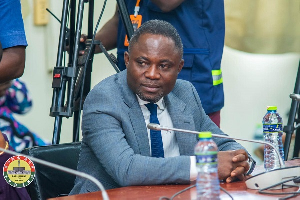It is intriguing to listen to President John Mahama's newly appointed Chief Executive Officer of Precious Minerals Marketing Company (PMMC) justifying the government's intentions for the creation of the Ghana Gold Board (GoldBod).
To start with, the creation of the Ghana Gold Board (GoldBod) is NOT a novelty. This same project concept is a plagiarized or, in other words, stolen version of the Guyana Gold Board (GGB).
By way of introduction, Guyana, officially the Co-operative Republic of Guyana, is a country on South America's North Atlantic Coast.
The Guyana Gold Board Act 1981 was passed on December 23, 1981, and subsequently gazetted on December 31, 1981, with Act number 12/1981. Following up the Act 1981, the Guyana Gold Board was officially established on May 15, 1982, pursuant to Section 3 of the Guyana Gold Board Act, Chapter 66:01 (Cap 66:01) of the Laws of Guyana to buy, sell, and export gold. The Gold Board was established in an era when capitalism in Guyana was under official attack, and the nationalization of large foreign-owned companies had been executed with zeal.
In accordance with Section 4 of the Guyana Gold Board Act, the Board shall:
1. Carry on the business of trading in gold.
2. Secure at all times an adequate supply of gold and ensure its equitable distribution in Guyana at fair prices.
3. Purchase all gold produced in Guyana.
4. Sell all gold in Guyana and sell gold outside Guyana.
Further, in accordance with Section 8 of the Guyana Gold Board, "No person shall sell any gold to, or purchase any gold from, any person other than the Board or any agent authorized in writing by the Board or export any gold." This is exactly the "beautiful nonsense" that the Chief Executive Officer of PMMC was trying to communicate to us on Asempa FM.
Just like Section 23 of the Guyana Gold Board, any Ghanaian who decides not to comply with the terms and conditions of the Ghana Gold Board shall face the following punishments:
1. Fine.
2. Imprisonment.
3. Forfeiture of the gold in respect of which the offense was committed.
The legal frameworks governing the activities of the Guyana Gold Board are as follows:
1. Guyana Gold Board Act.
2. Guyana Gold Board (Dealers) Regulations.
3. Guyana Gold Board (Dealers) (Amendment) Regulations.
4. Anti-money Laundering and Countering the Financing of Terrorism (AML/CFT) Act No. 13 of 2009.
5. Anti-money Laundering and Countering the Financing of Terrorism (Amendment) Act No. 15 of 2010.
6. Anti-money Laundering and Countering the Financing of Terrorism (Amendment) Act No. 7 & 10 of 2015.
7. Anti-money Laundering and Countering the Financing of Terrorism (Amendment) Act No. 21 of 2017.
8. Anti-money Laundering and Countering the Financing of Terrorism (Amendment) Act No. 17 of 2018.
9. Anti-money Laundering and Countering the Financing of Terrorism (Amendment) Act No. 12 of 2022.
10. Anti-money Laundering and Countering the Financing of Terrorism (AML/CFT) Regulations 2010.
11. Anti-money Laundering and Countering the Financing of Terrorism (AML/CFT) Regulations No. 4 of 2015.
12. Anti-money Laundering and Countering the Financing of Terrorism (Amendment) Regulations No. 1 of 2015.
Despite the aforementioned laws regulating the business trading of gold in Guyana, there have been several calls and advocacy for the abolishment of the Guyana Gold Board.
For instance, in 2016, a forensic audit into the Gold Board revealed that poor management and mafia gold trading resulted in losses of over ten billion US dollars ($10 billion) for the period of 2012 to 2014.
There have been several issues of manipulation with the computation of the pricing of the gold, and also, there has been a lack of transparency with the purchase price at the real-time price on the international market.
Per the investigations by Ram & McRae Chartered Accountants Professional Services Firm:
The Gold Board recorded a gross loss of $281.4 million in 2012, $9,716.6 million in 2013, and $79.6 million in 2014.
As of May 2015, the Gold Board owed the Ministry of Finance $8,731.6 million for advances received in September 2012. At the same date, the balance on the Gold Board's current account with the Bank of Guyana was an overdraft of $8,820 million, making a total of $17,552 million.
It does not seem that the Gold Board would be able in the foreseeable future to discharge its obligations to the Ministry of Finance or liquidate its various overdrafts with the Bank of Guyana. Moreover, the Gold Board Act was completely silent on how permanent losses are to be dealt with as well as considerations for a recapitalization of the Gold Board.
It has been established that, for the past 44 years, no advantages now accrue from the compulsory sale of gold to the government. The Gold Board of Guyana has lost a substantial sum of revenue because buying gold just under the world market price and selling it at the world market price by the government appears to be a no-brainer at all.
The control of the purchase and sale of gold by the government has given serious rise to an enormous amount of gold smuggling coupled with the highest rate of corruption in the gold industry. The Gold Board has been causing serious harm to the economy and the Guyanese people.
Honestly, we need strategic thinking approaches to the management of gold and other resources of Ghana.
Establishing the Ghana Gold Board similar to the Guyana Gold Board and functioning in a manner like the Ghana Cocoa Board is a complete waste of time, resources, and efforts of the country. The Gold Board would be serving as a conduit to perpetrate fraud, underhand dealings, family & friends hijack, money laundering, and massive corruption.
From all indications, it seems that the interest in Nyinahin Bauxite has been shifted to controlling the gold resources of Ghana under Mahama's government. We are closely monitoring the space of PMMC and the supposed Ghana Gold Board.
Opinions of Friday, 7 March 2025
Columnist: Dr Razak Kojo Opoku















